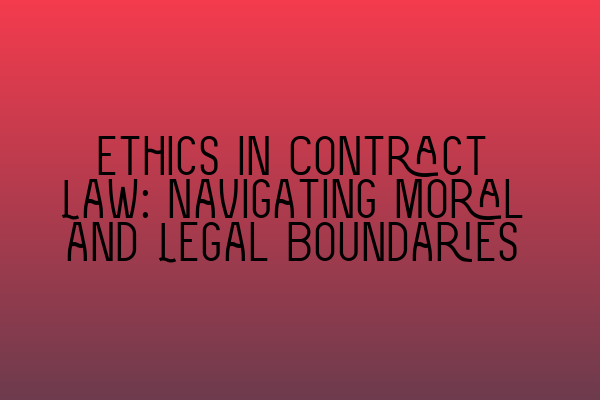Ethics in Contract Law: Navigating Moral and Legal Boundaries
As solicitors, we have a duty to uphold the principles of ethics and morality in our practice. Contract law, as a fundamental area of law, requires us to navigate the fine line between moral principles and legal obligations. In this blog post, we will explore the complex and nuanced world of ethics in contract law and discuss how solicitors can effectively navigate these boundaries.
The Importance of Ethical Considerations in Contract Law
Ethics play a crucial role in contract law as they ensure the fair and just treatment of parties involved in a contractual agreement. It is essential for solicitors to approach contract drafting, negotiation, and enforcement with integrity to protect their clients’ interests without compromising ethical standards.
One of the key ethical considerations in contract law is the principle of honesty. Solicitors must provide accurate and truthful information to their clients and other parties involved in the contract. Misrepresentation or concealment of material facts can lead to serious legal consequences and tarnish a solicitor’s professional reputation.
Moreover, solicitors must prioritize the principle of fairness when drafting and negotiating contracts. This means ensuring that the terms and conditions are reasonable and balanced, preventing any undue advantage for one party over another. By upholding fairness, solicitors contribute to the overall stability and credibility of contract law.
The Role of Morality in Contract Law
While contract law is primarily concerned with legal obligations, moral considerations can also come into play. Morality can be seen as a set of personal or societal values that shape our decisions and judgments about right and wrong. Although moral principles are not legally binding, they can influence how solicitors approach their work.
For example, a solicitor may have a personal moral objection to representing clients involved in certain industries, such as tobacco or arms manufacturing. In such cases, solicitors may choose to decline representation based on their moral beliefs, even if it does not violate any legal obligations. However, it is important for solicitors to balance their personal morality with their professional duty to provide adequate legal representation.
Challenges in Navigating Ethical and Moral Boundaries
Navigating the ethical and moral boundaries in contract law can pose significant challenges for solicitors. One challenge is the conflict between a solicitor’s duty to their client and their duty to the court. While solicitors have a duty to act in the best interests of their client, they must also uphold the integrity of the legal system. This can create ethical dilemmas when a client’s actions may be legally permissible but morally objectionable.
Another challenge is the pressure to prioritize financial gain over ethical considerations. In a competitive legal marketplace, solicitors may face temptations to compromise ethical standards in pursuit of profit. It is crucial for solicitors to maintain their integrity and resist such temptations, as ethical breaches can have severe consequences on their professional standing.
Navigating Ethical and Moral Boundaries Effectively
To navigate ethical and moral boundaries effectively, solicitors should prioritize ongoing professional development and stay updated on legal and ethical standards. Mentorship and guidance can play a vital role in developing a strong ethical framework and resolving any ethical dilemmas that may arise.
Furthermore, solicitors should foster strong communication and transparency with their clients. By clearly communicating the legal and ethical considerations involved in a contractual agreement, solicitors can ensure that clients are fully informed and empowered to make decisions aligned with their values.
In conclusion, ethics and morality are integral to the practice of contract law. Solicitors must balance legal obligations with ethical considerations to ensure the fair and just treatment of parties involved. By navigating these boundaries effectively, solicitors can uphold the integrity of both their profession and the legal system as a whole.
Related Articles:
- Mentorship for Aspiring Solicitors: Nurturing Talent in the Legal Field
- Legal Challenges and Pitfalls: Navigating the Complexities of the Legal System
- The GDL (Graduate Diploma in Law): A Pathway to Becoming a Solicitor
- Mastering the Solicitor’s Path: Prepare for the Journey Ahead
- The Benefits of Becoming a Solicitor: A Rewarding Career
